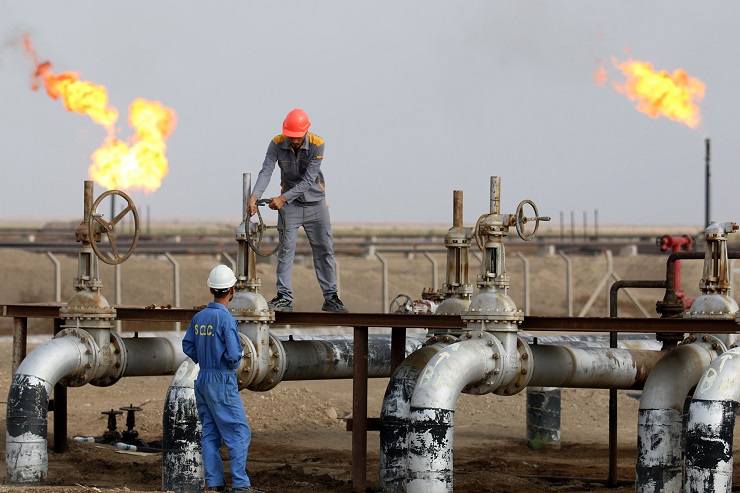Whereas the last two US presidents campaigned for withdrawal from the Middle East—and both of them did so in the wake of ‘shale oil revolution’ in the US itself—doing so has not only been difficult due largely to the geo-strategic setback that this withdrawal will give to the US supremacy in the Middle East, but also to the increasing competition the US is already facing from its strategic rivals: China and Russia. This withdrawal or a move towards limited presence would not have become politically and militarily frictional if it had not been followed by a rapid move-in of China and Russia.
As such and as it stands, these states’ ability to quickly fill the gaps is making it difficult for the US to even maintain a limited presence. Even a cursory look at the US military presence in the Middle East not only shows a progressive withdrawal in past few years, but also an almost equally proportional and glaringly visible activity of its competitors, creating a ‘withdraw or not to withdraw’ dilemma for successive US policy makers. The fact that countries like China continue to rapidly move-in and the US, despite its efforts to pick a fight, has failed to restrict its economic activity means that US cannot help but see its space shrinking, forcing it in part to move towards largely a non-military presence.
China is unwittingly accelerating what Obama and Trump had both promised to their electorates. Therefore, despite a continuous US presence in Iraq and its political engineering since its 2001 invasion, China has already become its biggest trading partner. Despite an ‘oil crisis’ earlier this year, Iraq’s exports have increased, thanks to China’s early recovery form COVID-19 and its deepening ties with Iraq. Whereas Iraq’s shipments to the US, India and South Korea shrank significantly in 2020, those to China rose by almost 27.5 per cent.
While this is in itself a massive rise, what makes it strategically important is the fact that the China-Iraq relations are deepening along side a parallel running US military withdrawal. That China may eventually come to dominate Iraqi oil exports also explains why the US has started paying extra attention to Iraqi oil. This is, to a great extent, rooted in the great-power competition in the Middle East whereby the US is unsuccessfully resisting China.
The Chinese are accordingly pushing forward and challenging the US in a big way. Whereas the China-Iran agreement shows how the Chinese are virtually disrupting the US policies, the recently announced ‘Amman Declaration’ shows how China is pro-actively deepening its relations with the rest of the Middle East as well.
With Arab states endorsing China’s central foreign policy concept of “a community with a shared future for mankind” and supporting its stance on Hong Kong and other regional and global issues, there is little to no denying that the Middle East on the whole sees in partnership with China huge prospects of economic development.
Already, China’s Asian Infrastructure Investment Bank (AIIB) has announced that its sixth Annual Meeting will be held in Dubai on October 27-28, 2021. This is the first time AIIB will hold its Annual Meeting in the Middle East, and it will take place in parallel with the Dubai World Expo. In the past years, the AIIB’s foothold in the Middle East has been growing through funding a number of projects in the region, including Oman’s biggest solar power project, which is by far the first renewable energy financing for AIIB in the region.
This explains why the Arab (and other non-Arab) countries have even developed a common outlook towards the otherwise sensitive issue of supposed ‘incarnation’ of ‘Muslims in Xinjiang, calling it China’s ‘counter-terrorism’ efforts and endorsing the overall de-radicalization project. The recent diplomatic battle at the UNO showed how China’s influence and political and economic clout is increasing, allowing it to secure crucial diplomatic victories.
While China’s increasing economic relations with the Arab/Middle Eastern countries may permanently secure its oil supplies, the ‘China factor’ along with its tendency to develop a web of economic networks and connectivity may also leave a transformative effect on the regional geo-political landscape, particularly in terms of reducing the intensity of regional rivalries.
While smoothening the Middle East may not be an easy feat for China even, economic development has its own logic, fundamentally different from [the US policies that involve] military bases and an active encouragement of regional rivalries.
While this is not to say that the US role in the Middle East will come to an end, the above discussed developments and the pattern and the scale on which this is happening do show that China is no longer a distant player and that it is increasing its space and presence at the expense of the US, making the US, notwithstanding its continued relative military leverage, the new distant player.
Salman Rafi Sheikh, research-analyst of International Relations and Pakistan’s foreign and domestic affairs, exclusively for the online magazine “New Eastern Outlook”.

